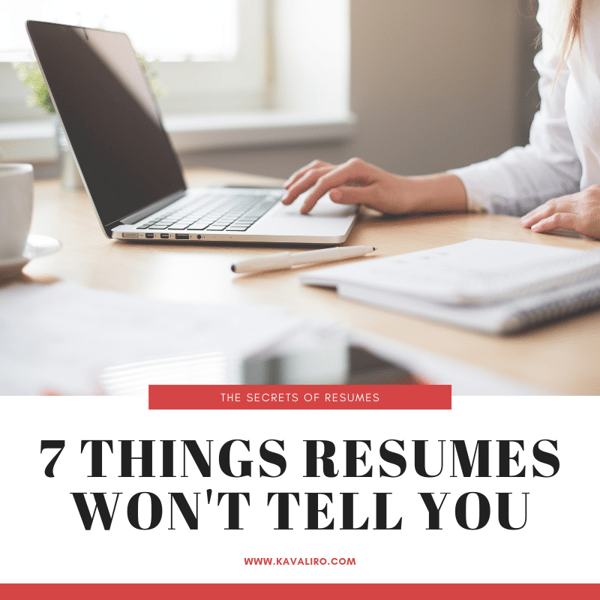![7 Critical Things a Resume Won't Tell You [Infographic]](https://blog.kavaliro.com/hubfs/7%20Things%20resumes%20won't%20tell%20you.png)
7 Critical Things a Resume Won't Tell You [Infographic]
As a technical, professional, and workforce solutions firm, we look at a lot of resumes daily. We're willing to bet if you are reading this, you probably do too. Hiring is getting harder and harder with such a tight labor market, so before you go out and review all those resumes for your company's new open job, keep in mind that a resume can not tell you everything about a candidate. If your company is going to invest time and money into a new hire, it is crucial that you hire the perfect candidate.

Reviewing resumes can be tedious and overwhelming. We hear things like "all the resumes look the same," "I don't understand half the jargon on this," and "I still have no idea who this candidate is as a person."
With so many job opening and so few employees (especially in the tech sector), Kavaliro has noticed a slight shift in hiring. Companies are now looking for a type of employee rather than a specific skill set. Companies realize that by shifting their focus to the more human side of an employee, they will have a higher retention rate with said employee.
One of the side effects of this shift is that companies can no longer rely solely on the skills listed on a resume and putting more focus on who an employee is. As you review resumes, keep in mind the things a resume will not tell you and know that that soft skill may be the difference between a good hire and a great hire.
1. Attitude
Resumes will not tell you anything about a candidate's attitude. What a person did at their last job is nice to know but not as important as how they accomplished the task. When you are building a team and looking to hire the best, the employee's attitude, and how they mesh with your team can make all the difference.
2. Work Ethic
The employee's resume makes them look like they have accomplished a lot over the past six years with their previous employer, but how much of that was their work compared to the work of their department? If you are a smaller company work ethic is everything and can make the difference in your profits. Work ethic is not something that can be listed on a resume but is something that can be found out through references.
After you have reviewed the resume and done an initial phone screen, you should conduct the candidate's references. References will allow you to see the kind of 'go-getter attitude' a potential employee might have. Ask questions regarding their ability to meet deadlines and how often they go above and beyond.
3. Accomplishments
While a resume may list certifications or achievements, future employees are cut and dry in listing the things that they have accomplished at their past roles. While it is excellent that they increased conversion rates by 43%, that fact tells us nothing about what the employee thought their accomplishments were. Knowing what an employee sees as an accomplishment gives you a look into their mind that a resume can not provide. This will also help you better reward them if you end up hiring them.
4. Impact
What impact the candidate had on their company can be seen in a resume, but the effect they had on the company culture and their coworkers will not be. With a shift towards a more employee-focused work environment, and a big push to create an awesome company culture, "impact" should play big into your hiring practice.
5. Motivation
How does an employee become motivated? Motivation is not on a resume, nor can it be inferred from the resume. What motivates an employee is essential information you need to know before hiring anyone. If your office has a hands-off management style, and a candidate prefers a more involved method of management to be motivated, they might not be the right fit for your company.
6. Ability to learn
A new job means new skills. The ability to learn new skills, technologies, and ways of thinking are a must for every individual you hire. While a resume will not give you direct insight into someones ability to learn, it can show you a willingness to become educated. Look for certifications, additional training, or how many technologies they list. This information should give you an indication as to whether or not an individual wants to learn more.
7. Soft Skills
Resumes don't often list soft skills, and if they do, they get lost in big broad terminology like "people person." Finding candidates' extra skill sets or soft skills is critical. There is nothing worse than hiring a team member to find out that their personality and style of work does not fit that of your company culture. Soft skill range from being able to negotiate to having the ability to communicate clearly.
.png?width=600&name=7%20THINGS%20RESUMES%20WON'T%20TELL%20YOU%20(1).png)
Resumes are a tool to measure the necessary skills and education levels, and that is about it. Companies should be much more focused on building the right teams to help their company achieve its goals. Due to the current shift in the labor markets and employment trends, team members don't stay with companies long term as often as they did in prior decades. If you want your employee to last longer than three years we recommend trying to build a team that will work together, grow together and prosper together.